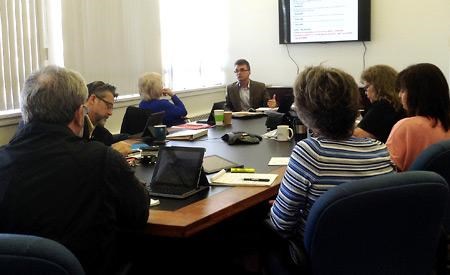As if delivered by decree, City of Powell River budget committee heard the words: “Thou shall not go to strange places and risk money.”
This was part of a message delivered by Mac Fraser, chief administrative officer, at a meeting April 9. Fraser outlined a conservative five-year plan proposed to allow the city to weather the current period of economic retraction. In his verbal “state of the nation” report, Fraser explained that if successful, the plan would also place the city in a position to take advantage of new and emerging opportunities for economic growth and development.
“The new guidelines maintain the spirit of the stated guiding principle council has agreed to uphold of living within our means,” Fraser said. “This says that no matter what the world throws at us, we will keep the municipal operating budget within the scope of the five-year plan.”
In addition to running a well-defined budget he pointed out that senior staff will be ready to embrace, promote and seek opportunity for new and innovative business and community development.
One of the tasks facing council is the need to make up for a budget shortfall of $937,143 heading into the 2014-2015 fiscal year.
Mayor Dave Formosa suggested one possible option of splitting the burden between residential taxation and Catalyst Paper Corporation Powell River Division rate would be to increase both by 1.5 per cent.
Fraser noted that council could also consider a joint option to draw from reserve funds to balance the books.“The goal before committee and council is to continue to develop a positive cash flow using increased revenues, increased efficiency and, possibly by raising tax rates,” he said.
However, any raise in rates cannot be above the annual increase in cost of living, according to the Community Charter. “This does not leave much room,” he said. “This leaves us with maintenance of the cost, but not maintenance of the status quo of operations.”
Due to several pivotal debt retirement events the cost of servicing city debt by 2017 is expected to drop from $1 million to approximately $500,000, explained Fraser, allowing for a positive course change midway through the plan. “This provides a positive cash flow opportunity,” he said. “We will collect money as general operations. It goes into an operational budget and it turns into a contribution to reserve—which may be capital in nature —but the bottom line is that it comes in the door as operations. Our capital position grows as the contributions to reserves grows.”
Fraser does not want to see the city merely surviving from one budget to another while planning for posterity. “The goal is to advance the financial viability and sustainability of the city within the next five years,” he said.
Fraser described a picture of arms up and sharp elbows for the 157 local governments that make up the province in order to either defend the realm or to expand the empire. “We can’t do that any longer,” he warned. “Within the stated five-year plan the budget preparation will become proactive, rather than reactive, and put the city on firmer footing.” Managed strategically, Fraser explained, a business can be run with a very clear understanding of the available budget within a five-year plan if there are fixed financial resources available.
“There are some exciting ongoing economic initiatives that will undoubtedly have a positive effect on the local economy as well,” he said. Within five years he sees the assessment roll and municipal revenue increase. “But the municipality cannot plan on these future developments until they are in-hand.”
Fraser pointed out that the committee recently delivered a water budget with a predicted zero per cent increase into the foreseeable future. Though sewer rates need to be finalized the projection is again for zero per cent increase. “Through our asset management plan, we’ve gotten within reach of a sustainable funding level,” Fraser said.
In what seems to be a favourite analogy, Fraser ended his delivery by looking at the city finances like one would the finances for a household. “Each of us have to run our homes,” he said. “We try to keep the basics in good shape to serve us now and in the future. It’s often the immediate financial demands of the household that can cause the most frustration and stop us from looking past the problems of today and planning for the future. Living within your means, means saving and spending cash rather than borrowing money and paying high costs to service the debt over time.”


.jpg;w=120;h=80;mode=crop)
